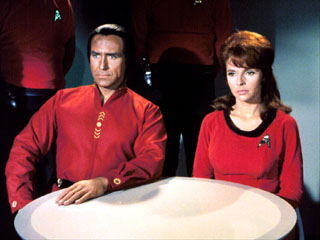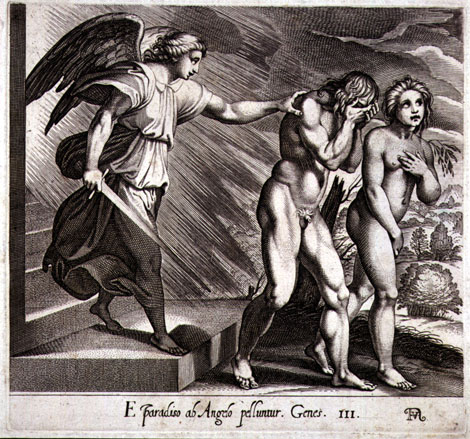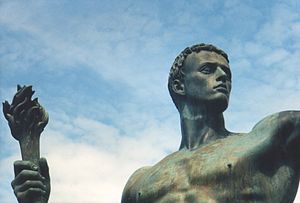Aside from what I would randomly catch while channel surfing, I hadn’t revisited TOS in a long while. Settling down to review “Space Seed” was not only a lot of fun, but also surprised me with the level of subtext I found now that I’ve seen it as an adult.
I don’t think I need to delve too deeply into the plot of “Space Seed”, but as a refresher, the USS Enterprise comes across a derelict ship, the SS Botany Bay, and upon investigating, discover that it is home to 73 people from the 1990s who have been in suspended animation for centuries. One awakens and is nursed back to health by Dr. McCoy and immediately begins to plan on taking over the Enterprise for he is none other than Khan, an augmented tyrant of earth who had fled with his remaining fellow super beings at the end of the Eugenic War. Bending the weak will of Lt. McGivers, he frees his fellow travelers, takes over the ship and nearly kills Kirk before McGivers, guilty at her actions, frees Kirk. The crew retakes their ship, but not before an epic battle between Kirk and Khan wherein Kirk triumphs over the supposed superior specimen by beating him up with a Nerf prop. In a moment of kindness, Kirk exiles Khan and his people to a far off planet which only sets the stage for greater tragedy that would take place years later.
Nothing about this episode in and of itself stands out as truly amazing on its own merits, but the whole of the story definitely has a lot to say, not only about the time period it was filmed, the level of intelligence it expected to find in its audience, and the inability of humans to learn from the mistakes of the past.
 One of the overt themes found is the weakness of women. Khan never could have accomplished what he did without the willing help of McGivers who positively swoons and drools over the power he exudes. It is only through her treachery that he is able to awaken the other Augments and take control over the Enterprise. This, of course, is nothing more than a modern retelling of the Garden of Eve story in which Eve is tricked by the Serpent into eating the forbidden fruit and tricking all of mankind into falling. Khan, as the beguiling Serpent offers himself to her, and she falls powerless in his thrall. Of course, Star Trek managed to allow her to redeem herself and help save her crew, but she is still ‘exiled from the garden’ at the end of the episode and goes to stay with the Serpent (which is even alluded to via the Milton quote). Weak-willed women who are used only as sex objects are seen constantly throughout TOS, but few to the extent we see in “Space Seed”.
One of the overt themes found is the weakness of women. Khan never could have accomplished what he did without the willing help of McGivers who positively swoons and drools over the power he exudes. It is only through her treachery that he is able to awaken the other Augments and take control over the Enterprise. This, of course, is nothing more than a modern retelling of the Garden of Eve story in which Eve is tricked by the Serpent into eating the forbidden fruit and tricking all of mankind into falling. Khan, as the beguiling Serpent offers himself to her, and she falls powerless in his thrall. Of course, Star Trek managed to allow her to redeem herself and help save her crew, but she is still ‘exiled from the garden’ at the end of the episode and goes to stay with the Serpent (which is even alluded to via the Milton quote). Weak-willed women who are used only as sex objects are seen constantly throughout TOS, but few to the extent we see in “Space Seed”.
The episode also assumes its audience aren’t mindless drones laughing and being titillated by every little innuendo or joke thrown their way (cough, Two and a Half Men, cough). Star Trek actually expected that fans understood some references to the classics and history. One would be hard pressed to find a show quoting Milton these days, and those that did would have to explicitly spell out the meaning behind their words. People may disagree and point to the success of books like The Da Vinci Code and Angels & Demons, but if you’re honestly trying to prove your point with those examples, then you’ve already lost your side of the argument. Americans don’t read any more, and our lack of knowledge about the classics is becoming telling.
Finally, the crew was quite amused (moreso in Spock’s case) that humans used to breed specifically to create a race of people who were genetically superior to the rest of humanity. The writers of Star Trek had obviously been around during part of World War II, so the idea of a superior race would still have been fresh on their minds as one of the worst ideas that had possibly sprung from the mind of a madman. Not only did the theory not work, but the zealots who bought into the whole idea were responsible for nearly wiping a race of people from the face of the earth and the deaths of untold millions in the ensuing war. As was mentioned in the episode, the 1990s were when the last World War supposedly took place, which only proved the stupidity of man in not learning from the past. Of course this time, mankind did succeed at making a superior race, but in an ironic twist, their master race immediately set to enslaving those beneath them and becoming their rightful rulers.
Having not seen this episode since I was a kid, I didn’t quite expect to get so much out of a tv show that aired over 40 years ago, and maybe I’m reading between the lines too much and seeing more than the writers originally intended, but I don’t think so. Science fiction has oft been on the forefront of social commentary although the message can easily be missed between the phasers and spaceships going into warp speed. Needless to say, I thoroughly enjoyed my journey back in time to catch up with a classic that will only lead on to bigger and better drama and spectacle in the future.

